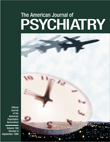Association of Depressive Symptoms During Abstinence With the Subjective High Produced by Cocaine
Abstract
OBJECTIVE: During early abstinence, many cocaine-dependent individuals experience symptoms such as anhedonia, craving, fatigue, insomnia, and dysphoria. While several studies have shown an association between depressive symptoms and negative treatment outcome, the reasons for this association are unclear. The authors conducted this study in order to determine the association between severity of depressive symptoms during early abstinence and subjective effects of experimentally administered cocaine. METHOD: Seventeen cocaine-dependent individuals achieved 5 days of abstinence in a hospital setting. Forty mg of cocaine was given intravenously on the fifth day of abstinence, and participants were asked to rate the subjective effects produced by the cocaine. The relationship between the subjective high produced by cocaine and the symptoms experienced during the 5 days of abstinence was evaluated. RESULTS: Individuals experiencing more intense depressive symptoms experienced a significantly greater high from the 40-mg cocaine infusion than individuals who did not. CONCLUSIONS: These data suggest that the severity of depressive symptoms experienced during initial abstinence is associated with the intensity of the subsequent high produced by cocaine. This finding could help explain why individuals who experience greater levels of depression-like symptoms during abstinence appear to be at greater risk for unsuccessful treatment outcome.



